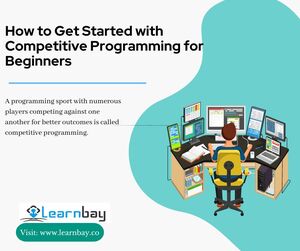How to Get Started with Competitive Programming for Beginners
Body
Competitive programming is a programming game with numerous players competing against one another for better outcomes. One's mental faculties are improved, and analytical and reasoning abilities are developed. More than ever before, competitive programming is widespread. Today's online programming community is vibrant and competitive, and several competitions happen every week. Competitor challenges are getting worse at the same time.
However, learning data structures and algorithms is the most effective way for competitive programming. Check out the DSA course, to start upgrading your DSA knowledge.
How Can I Start Learning Competitive Coding?
-
Acquiring programming language skills
A programming language must be learned before beginning competitive programming. Any language would work if you already have a preference. The most suggested languages for someone who has just begun learning a new language are C, C++, or Java because most problems are written in these dialects. Because execution time is a crucial component in competitive programming, this is the reason. You will undoubtedly get an edge by selecting a language with a quick execution time.
C++ is simple to learn if you are familiar with C. Because C++ has more features than C, switching from C to C++ is advised.
Classes and generics/templates are not necessarily advanced concepts for you to understand. The standard library's math functions, string/array operations, input/output, and if/else statements, loops, arrays, and functions should be familiar to you.
How to Begin Problem-Solving
Competitive programming is supported by an increasing number of platforms every day. You have a wide variety of excellent starting platforms to pick from. HackerRank and Atcoder are good places to start (Beginner). It features the most beginner-friendly IDE and problems for learning and honing basic problem-solving abilities and language mastery. Several additional platforms are highly recommended.
- Codeforces
- CodeChef
- Atcoder
- TopCoder
- HackerEarth
- LeetCode
- SPOJ
- Project Euler
Problem-Solving
Start your investigation by figuring out basic issues like finding a prime number, counting the factors of a given number, counting the digits in a given number, locating a number in an array, and other issues that may be solved with loops, functions, text, etc. These kinds of issues can be discovered in HackerRank, which is advised.
These issues may appear simple, but rehearsing them frequently at the start of your journey can enhance your speed, clarity of thought, and ability to produce error-free code.
Learning (DSA) Data Structures and Algorithms
The term "data structures" refers to arranging the data to make it easy to store and retrieve it while also taking care of system optimization.
Every logical approach can be written down in basic language using an algorithm, which can be further programmed. It takes a lot of work to develop an algorithm; in addition to the algorithm itself, we must also consider the system requirements, the code's efficiency, and a host of other aspects that have to do with hardware and software. Data structure plays a crucial part in this situation, so it is best to study both ideas together for a clearer understanding.
Data Structures and Algorithms(DSA) will be your long-term partner in helping you tackle issues with minimal time and space complexities as you advance as a competitive programmer.
-
Time complexity
An algorithm's time complexity is measured as a function of the input length, n, and describes how long it takes to finish a task. Asymptotic notations are frequently used to represent how time-consuming a method is Big O, Big Theta Θ, Big Omega Ω.
-
Space complexity
The amount of space (or memory) an algorithm requires to operate as a function of its input length, n, is known as the algorithm's space complexity. Auxiliary space (the temporary or additional space used by the algorithm while it is being executed.) and input space are included in the space complexity concept. Big O (O(n)) notation is frequently used to describe an algorithm's space complexity.
When engaging in competitive programming, these two will be vital in determining the outcome of the solution. Algorithms and data structures are useful in this situation.
Mastering Data Structures
Using data structures allows for the efficient storage and organization of data. Knowing the data structures to employ while solving an issue can greatly reduce the required time and affect how successful your solution will be. A few crucial data structures to learn are listed below:
- Arrays
- Linked Lists
- Stacks
- Queues
- Binary Trees
- Heaps
- Graphs
- Tries
A detailed explanation of these topics will be explained in an online data structure course, offered by Learnbay.
Mastering Algorithmic problem-solving techniques
Any specific computational process, known as an algorithm that accepts an input value or set of values and outputs an output value or set of values is considered an algorithm. You can improve your problem-solving techniques, identify patterns, and handle difficult situations by having a working knowledge of some well-known algorithms. For competitive coding, these are some popular concepts:
- Searching
- Sorting
- Mathematical Algorithms
- Graph Algorithms
- Greedy
- Divide and Conquer
- Dynamic Programming
We all tend to solve many problems without taking the time to understand new concepts fully. Programming fundamentals, including data structures and algorithms, must be continually studied and reviewed.
Practice, Practice, and Practice
Being consistent and continuing to solve challenges on a daily basis is essential in competitive programming.
You can occasionally struggle to find solutions while practicing. Don't give up easily in these circumstances! Keep on trying! But occasionally, even after working on it for hours, we still can't figure it out. In those cases, it is a good idea to read blogs and books. Editorials that break down solutions into steps make things clear. Reading them will also teach you fresh, innovative approaches to challenges. You should read editorials frequently, even after finding a solution to an issue. In some cases, you should also examine additional codes. You might also discover new approaches to difficulties using it.
When friends are involved, competitive programming is considerably more enjoyable. You may always stay motivated and fired up by participating in competitions and contests with your friends and debating various strategies.
I hope this blog on competitive programming was helpful for your coding journey. If you want to improve your coding or DSA skills, then register in the top data structure and algorithms course, and get certified by IBM.














Comments